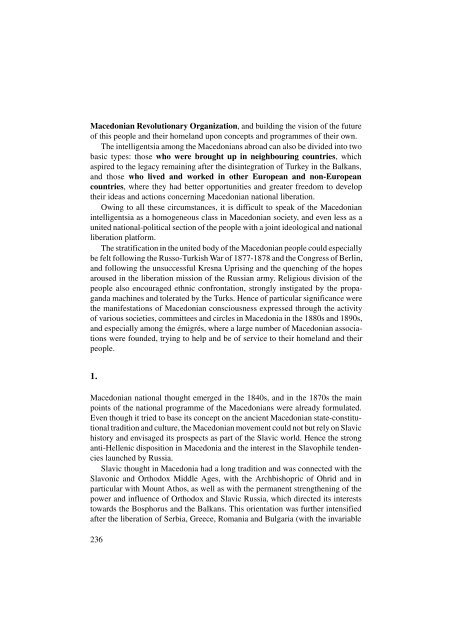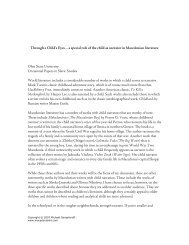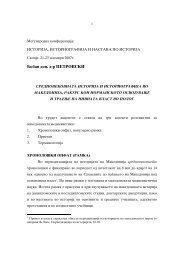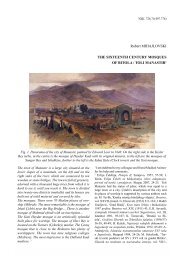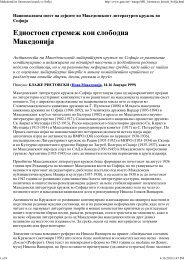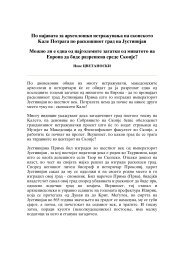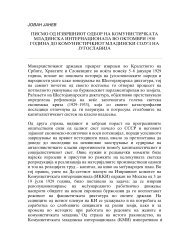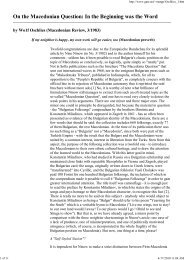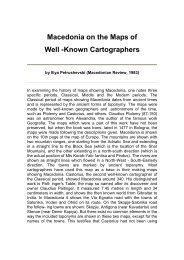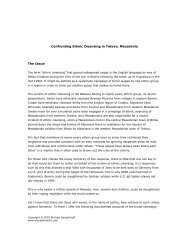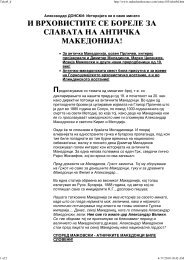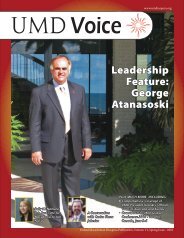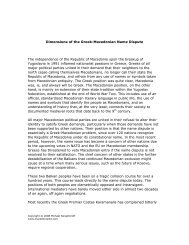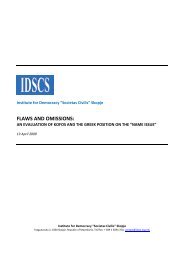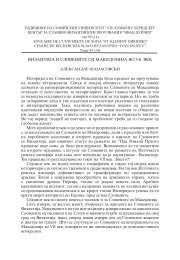Macedonian State-National Concepts and ... - Makedonika
Macedonian State-National Concepts and ... - Makedonika
Macedonian State-National Concepts and ... - Makedonika
You also want an ePaper? Increase the reach of your titles
YUMPU automatically turns print PDFs into web optimized ePapers that Google loves.
<strong>Macedonian</strong> Revolutionary Organization, <strong>and</strong> building the vision of the future<br />
of this people <strong>and</strong> their homel<strong>and</strong> upon concepts <strong>and</strong> programmes of their own.<br />
The intelligentsia among the <strong>Macedonian</strong>s abroad can also be divided into two<br />
basic types: those who were brought up in neighbouring countries, which<br />
aspired to the legacy remaining after the disintegration of Turkey in the Balkans,<br />
<strong>and</strong> those who lived <strong>and</strong> worked in other European <strong>and</strong> non-European<br />
countries, where they had better opportunities <strong>and</strong> greater freedom to develop<br />
their ideas <strong>and</strong> actions concerning <strong>Macedonian</strong> national liberation.<br />
Owing to all these circumstances, it is difficult to speak of the <strong>Macedonian</strong><br />
intelligentsia as a homogeneous class in <strong>Macedonian</strong> society, <strong>and</strong> even less as a<br />
united national-political section of the people with a joint ideological <strong>and</strong> national<br />
liberation platform.<br />
The stratification in the united body of the <strong>Macedonian</strong> people could especially<br />
be felt following the Russo-Turkish War of 1877-1878 <strong>and</strong> the Congress of Berlin,<br />
<strong>and</strong> following the unsuccessful Kresna Uprising <strong>and</strong> the quenching of the hopes<br />
aroused in the liberation mission of the Russian army. Religious division of the<br />
people also encouraged ethnic confrontation, strongly instigated by the propag<strong>and</strong>a<br />
machines <strong>and</strong> tolerated by the Turks. Hence of particular significance were<br />
the manifestations of <strong>Macedonian</strong> consciousness expressed through the activity<br />
of various societies, committees <strong>and</strong> circles in Macedonia in the 1880s <strong>and</strong> 1890s,<br />
<strong>and</strong> especially among the émigrés, where a large number of <strong>Macedonian</strong> associations<br />
were founded, trying to help <strong>and</strong> be of service to their homel<strong>and</strong> <strong>and</strong> their<br />
people.<br />
1.<br />
<strong>Macedonian</strong> national thought emerged in the 1840s, <strong>and</strong> in the 1870s the main<br />
points of the national programme of the <strong>Macedonian</strong>s were already formulated.<br />
Even though it tried to base its concept on the ancient <strong>Macedonian</strong> state-constitutional<br />
tradition <strong>and</strong> culture, the <strong>Macedonian</strong> movement could not but rely on Slavic<br />
history <strong>and</strong> envisaged its prospects as part of the Slavic world. Hence the strong<br />
anti-Hellenic disposition in Macedonia <strong>and</strong> the interest in the Slavophile tendencies<br />
launched by Russia.<br />
Slavic thought in Macedonia had a long tradition <strong>and</strong> was connected with the<br />
Slavonic <strong>and</strong> Orthodox Middle Ages, with the Archbishopric of Ohrid <strong>and</strong> in<br />
particular with Mount Athos, as well as with the permanent strengthening of the<br />
power <strong>and</strong> influence of Orthodox <strong>and</strong> Slavic Russia, which directed its interests<br />
towards the Bosphorus <strong>and</strong> the Balkans. This orientation was further intensified<br />
after the liberation of Serbia, Greece, Romania <strong>and</strong> Bulgaria (with the invariable<br />
236


